- Pests, overdoses, thieves and storms are some of the calamities that can leave you without any crops, and condemn you to a whole year of empty bottles. They are like the “Horsemen of the Apocalypse” for those who embrace the way of self-cultivation.
- So don't think twice: wake up and be on the lookout! And keep these foul forces from entering the sacrosanct sanctuary of your garden of joy.

Don't let storms sink your harvest
Storms are one of the great hazards that outdoor grass growers must confront. Beginning at the end of the summer - in which flowering is already underway in these parts - to the glorious harvest day, you must be very careful and cautious with inclement meteorological conditions.
Rain can pose many problems for your garden. If it pours the water washes away earth and cleans roots, leaving plants without enough fertilizer. Simultaneously, in a paradoxical way, if a good rainstorm falls and you have used a powder fertilizer, like humus or guano, it will dissolve too fast and can overfertilise your plants. Unfortunately, this won't be the only problem that heavy showers can bring: if they are very frequent your plant might end up developing botrytis (grey mould), which spreads like wildfire, with which you need to take great care.
Besides looking out so that said situations do not occur, it is very important to never cut your plants after it rains. Wait for a sunny day to do so, or your buds are very likely to develop fungi.
How to prevent:
If you cover the plants with a tarp - one that does not touch them - this will go a long way towards prevention. You can also separate the plants more than normal so that they get more air and dry faster. If you decide to get protective and put your plants inside, be sure not to expose them to any light sources, so as not to alter their photoperiod.
How to cure:
If your plant develops mould, the best thing is to cut the affected area. Don't hold back. It spreads very fast and is always even worse than it looks, so you'll have to wince and "cut off the leg to save the patient," as they say.
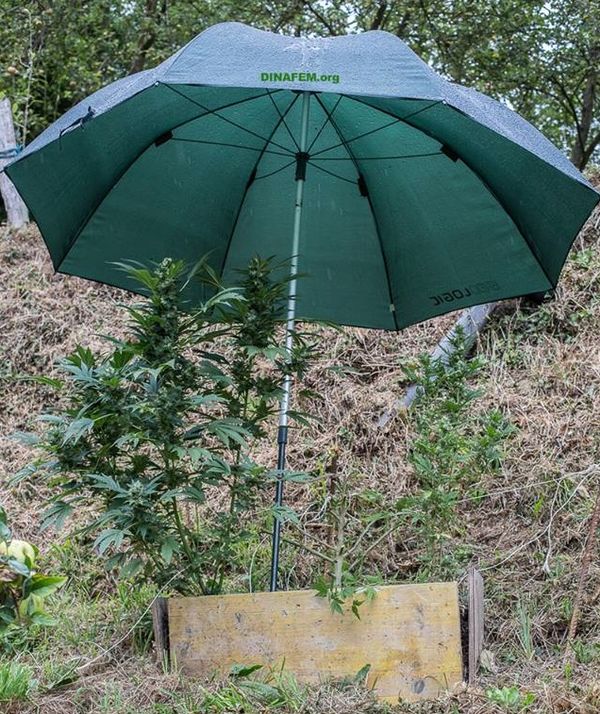
A storm can trigger very unpleasant consequences, so always have a remedy ready. ;-) (Photo)
There's nothing worse than pests on your plants!
Pests are one of marijuana plants' biggest menaces. There are a myriad of small - and not so small - bugs that appear out of nowhere and can drive you to lose your patience, and your harvest, if you're not extremely careful. The most common type: "bloodsuckers," or those that absorb the plant's sap. This is case with insidious aphids, the dreaded whitefly, or the deadly terrorist of fields: the red spider mite. Without overlooking that great bud surfer: the caterpillar, who uses its deadly jaws to suck the sap from internal flower stems. All these intruders can have disastrous effects on your crop due to the great amounts of energy they deprive your plants, and the great number of diseases and fungi they produce.
How to prevent:
There are numerous products to design a very effective prevention strategy, or the old homemade trick of sprinkling your plants every two or three days with a macerated solution of cigarettes and water, which is moderately effective in case you have nothing else in your medicine cabinet.
How to cure:
Pests are ... well, pesty, and once they appear they are virulent and difficult to eradicate. That said, they can usually be reduced or eliminated by spraying your plants with soapy water, or with pyrethin. Every pest, however, is unique, and some withstand our efforts to eliminate them better than others.
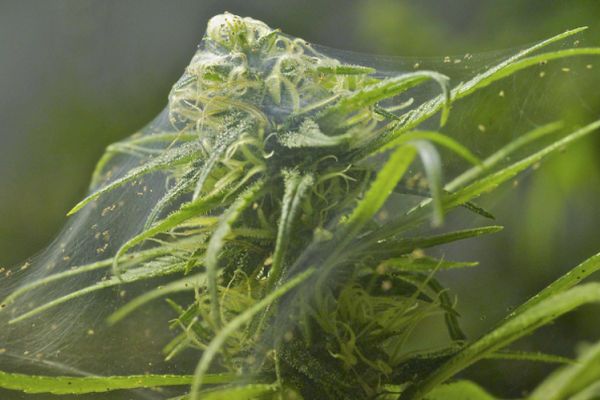
The dreadful effects of the red spider mite: fast, lethal, and quite common. Look out! (Photo)
Overdoses: the sad story of plants that die from an excess of nutrients
Who hasn't at some point given his plants nutrients and, when seeing them recover, and their buds swell up like they were on steroids, decided to use a little bit too much? ''Just a little bit more, this is medicine, with everything the plant needs," new growers often say. Then, to their great surprise, they approach their cherished children and find their leaves curving inwards like claws, and their colour morphing from marijuana's beautiful bright green to a sickly brown. The plants have been poisoned by an overdose of nutrients, and without quick action damage or death is inevitable.
How to prevent:
By being sensible and using the exact doses recommend by the product manufacturers for growth or flowering.
How to cure:
Give the soil and roots a good bath. Use at least two litres of water for one of earth. If you really went too far the best thing to do is thoroughly wash the earth and roots, for a good while.
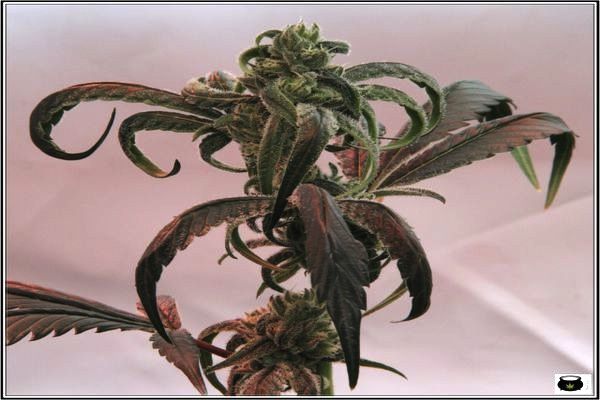 Swing into action fast if your plants' leaves begin to look like curling claws. (Photo)
Swing into action fast if your plants' leaves begin to look like curling claws. (Photo)
Discrete and supervised plants = safe plants
The more discreet you are about where you position your plants, and the people you show them to, the more likely your resinous buds are to remain safe from unscrupulous thieves, the authorities, or greedy "friends" who have no qualms about "borrowing" from you. To thwart undesired intruders and theft you should protect your garden with security devices, especially during the end of the flowering period.
How to prevent:
A good and cheap method is to place fishing lines with bells hanging on them around the perimeter of your garden to alert you in the event someone sneaks in.
How to cure:
Unfortunately the robbery of plants is irreparable and quite common. You'll just have to suck it up, wait until next year, and be more careful next time.
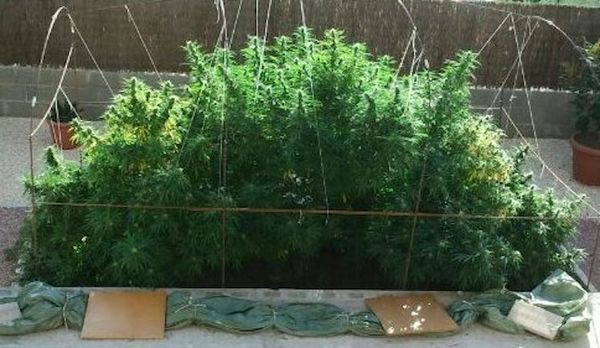 Photo: An ingenious structure of fishing line to support and protect the plants at the same time. (Photo)
Photo: An ingenious structure of fishing line to support and protect the plants at the same time. (Photo)
If your plants lose their voluptuous curves, you'll be the one losing out
There are few things more displeasing than waking up one day to visit your plants, coffee still in hand, and realize that a series of necrotic spots have covered their green leaves, or that the tips of the leaves are wilting, as if you had doused them with acid. The problem: a lack of nutrients. Your plants are underfed. At the same time your leaves are degrading, the plant has stopped growing at the rate it should to reach its maximum potential. If you don't apply an effective remedy, and fast, your plant will become a rickety and sickly caricature of the beautiful and enchanting plant that it was destined to be.
Fertilising the plants a pair of times per week, monitoring the PH of the water and the soil, and cleaning the soil and roots with water from time to time to avoid the opposite extreme: overfertilisation, as discussed above.
How to cure:
Identify your plants' mineral deficiencies and generously correct them so that they can recover their health and vitality.
 Take a good look at the table, with its thin and wilting plants. Not at all cool! (Photo)
Take a good look at the table, with its thin and wilting plants. Not at all cool! (Photo)
I hate those meeces to pieces! Critters, birdies, pests and other lovers of THC
Human beings are not the only animals that like to get high. By no means. Many other of the Earth's inhabitants enjoy the pleasant sensation of a good dose of THC, but they can´t buy marijuana, or plant it, or roll it (except for some nimble-fingered monkeys, maybe). What they can do - and without any doubt will - is swarm all over your beloved green children and gobble them down like a bunch of grass-addicted zombies.
How to prevent:
Putting up a fence is usually a good idea, as it dissuades the largest predators. Wild boars for example, love to dig up the roots. Fending off birds is also always a good idea; hanging CDs (which reflect the sunlight) and metal tubes (which make noise) tends to be fairly effective.
How to cure:
If an animal has chowed down and devoured a whole rich branch full of buds, there's not much you can do. Now, if it was your pet you can seize the opportunity offered by its high to smoke a joint and develop your relationship from a different perspective.
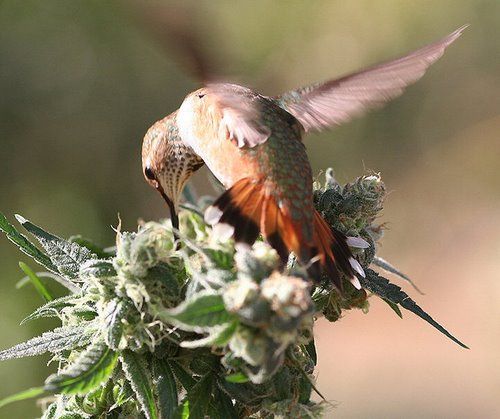
Photo: A hummingbird shamelessly chowing on a bud. (Photo)



Comments from our readers
Read comments in other languages:
Did you like this post?
Your opinion about our seeds is very important to us and can help other users a lot (your email address won't be made public).